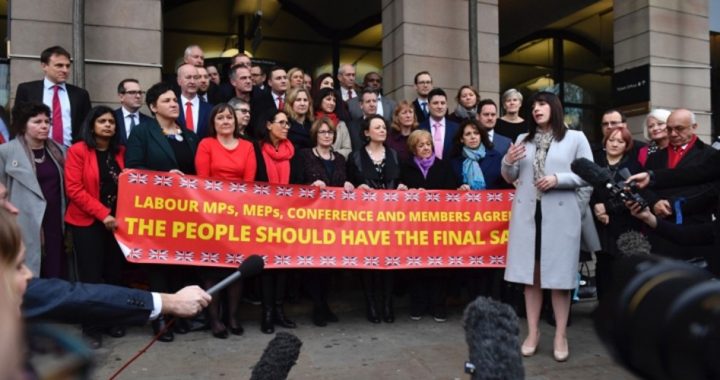
The disastrous defeat of Prime Minister Theresa May’s Brexit plan in the House of Commons Tuesday has emboldened many in Parliament and throughout the United Kingdom to call for a nationwide “do-over” of the original Brexit vote of 2016.
Back in 2016, British voters were asked one simple question. It read, “Should the United Kingdom remain a member of the European Union or leave the European Union?” There were but two possible answers: “Remain a member of the European Union” and “Leave the European Union.”
Simple enough, right? “Leave the European Union” won by 52-48 percent.
But in the intervening two and a half years, politicians on both sides of the English Channel have sufficiently confused and complicated the issue so that now Brexit, which should be a done deal, is now in utter chaos with only 70 days left until Great Britain is scheduled to leave the EU.
Seventy-one Labour Party MPs came out today in support of a new referendum, saying it was “the only logical option” if their leader, Jeremy Corbyn, was unsuccessful in his push to call for a new general election. And Corbyn was unsuccessful in his bid to remove May from office as his call for a vote of no-confidence in Theresa May failed by a 325-306 count.
London Mayor Sadiq Khan has been saying for months that a new referendum is needed on Brexit. “Unfortunately, we’re at a position now where the government’s embarking on negotiations that could lead to one of two things, either a bad deal, and that includes the possibility of us leaving the EU without knowing the future relationship with the European Union, or no deal, and both those options would be deeply damaging to London and the country. So, what I’m saying to the government is for the first time the British public should have a say on the outcome of those negotiations, including the option of staying in the EU.”
Former Prime Minister Tony Blair has also called for a new referendum, saying that it’s the “logical” thing to do. “If you do get to a blockage in Parliament that’s what opens up the possibility of going back to the people,” Blair said recently. “It’s a simple argument. You say, we’ve been two-and-a-bit years trying to reach an agreement; we can’t reach an agreement that works. Parliament’s blocked, you the people have now got to decide in the light of the information you’ve got…. You the people have now got to tell us what do you want to do — do you want to proceed or do you want to remain?”
The current government is still led by Theresa May, who is strongly against any re-vote. May has declared that it is “incumbent” that the government deliver on the original 2016 vote or risk losing the trust of the nation. She has said that the people of the U.K. gave the government “a solemn responsibility to deliver Brexit.” Failure to do so would be an abdication of that “solemn trust.”
Polls are currently showing that a new referendum on Brexit would likely fail. When adjusted for those who are undecided, the polling firm YouGov shows that a new referendum would break at approximately 54 percent Remain in the EU to 46 percent Leave.
But polls, of course, can be quite wrong. In 2016, for instance, polls showed there was an 80-percent chance that Britons would vote to remain in the European Union. How did that turn out?
In the history of the United Kingdom, there have been only three national referendums. Two of them had to do with the nation’s relationship to Europe. In 1975, Brits voted 67 percent to 33 percent to join the European Community, also known as the Common Market. The Common Market was the first pillar in what would become the European Union in 1993. Over the years, the British people became more and more uncomfortable with the various rules and laws imposed upon them by a foreign government; this led to the 2016 referendum.
And that referendum was simple enough. The British people voted to leave the EU. All of the complications of the past two-and-a half-years have been brought about by politicians who have deliberately confused the issue as to make it incomprehensible to the average British citizen. Many of those same politicians are now hoping that the people, seeing those complications that the politicians themselves brought about, will now shrug their shoulders and, given the chance, vote to remain in the EU to avoid all the trouble.
Photo: AP Images




